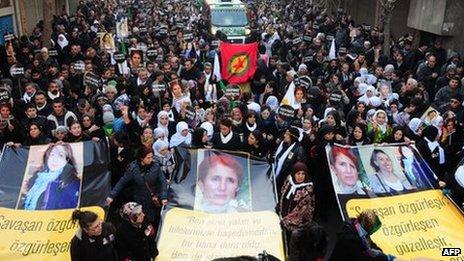Calls for peace at funerals of slain PKK activists
- Published

"Martyrs are immortal," chanted the Kurdish mourners.
Thousands squeezed onto the streets of Diyarbakir to escort the bodies of Sakine Cansiz, Fidan Dogan, and Leyla Saylemez - the three activists shot dead last week at their office in Paris.
The women's coffins were covered in the red, green, and yellow of the Kurdish flag and driven slowly through the city. Demonstrators held up signs which read "We are all Sakine."
Many Kurds in Diyarbakir believe that the three activists were killed by forces trying to destroy peace talks between the Kurdish armed movement, the PKK, and the Turkish government. Those talks began at the end of December - the first serious attempt at peace for 18 months.
"I think the killings will have an impact," said Newroz Yaruk, "But this gathering shows why we are all here. Our white scarves show what we want - we want peace. May our hearts stop burning with grief."
Dialogue calls
"When guerrillas speak, the whole world should listen," shouted two young men in the crowd wearing masks.
But, on this day, these men were in a minority. This funeral did not aim to show off the violent power of the PKK - a group designated as a terrorist organisation by Turkey, the EU and the USA.
Kurdish activists did not want to waste their spotlight on confrontation. They did not want to give any ammunition to groups in Turkey which accused Kurds of being needlessly violent and anarchic.
"We can solve our problems through dialogue," Selahattin Demirtas, the co-leader of the pro-Kurdish Peace and Democracy Party, told the crowd.
He spoke in Turkish - clearly aiming his message at the government in Ankara.
"What is the government giving us in return? Take a step for us to trust you. Show us a policy for peace. If you're brave enough, we're here," he said.
"By being here, you [the Kurdish people] show that you're ready for an honourable peace," said Ahmet Turk , another Kurdish MP.
At the start of the year, the Turkish government allowed Mr Turk to hold discussions with the PKK's leader Abdullah Ocalan.
Mr Ocalan has been imprisoned since 1999 on the island of Imrali in the Sea of Marmara. The discussions form part of the tentative peace process, whose future is uncertain.
Violence fears
The PKK has declared neither a ceasefire, nor its intention to disarm.
The organisation still has several thousand fighters, many of whom are based in the Qandil mountains of the Kurdish region of northern Iraq.
In recent days the Turkish military has launched from Diyarbakir a number of air raids on these PKK bases. Throughout the day in the city, the sound of Turkish military jets could be heard overhead. The air strikes angered many in the funeral crowd.
"Continuing to bomb the PKK may have an effect," said a Kurdish man who gave his name as Cevdet. "We are hoping for peace but after all we're humans, too. When we're losing our people every day, we can't just wait around with our hands tied."
The Turkish government worried that the women's funeral might end in violence.
As the ceremony ended, a group of several hundred young men marched up the hill towards a police station. Officers dressed in riot gear came out to stand in front of the main gate. But neither side confronted the other.
On this day, in this city, the Kurdish people wanted to show that there was more to their cause than the armed struggle alone.
Additional reporting by Zeynep Erdim
- Published17 January 2013
- Published15 January 2013
- Published15 January 2013
- Published4 November 2016
- Published11 January 2013
- Published8 January 2013